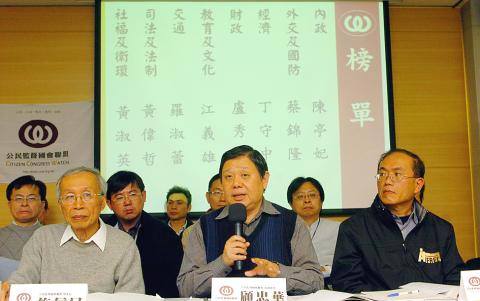The eighth session of the seventh legislature showed a decreased performance from the previous session as well as missing records for four lawmakers, a report by the Citizen’s Congress Watch (CCW) said yesterday.
The CCW is a civil society organization which oversees the legislature and publishes evaluation reports in order to provide transparency for the legislative environment and put pressure on legislators who do not perform adequately.
Former CCW chairman Ku Chung-hwa (顧忠華) said the unfavorable evaluation of the eighth session of seventh legislature was primarily because the the session was terminated early for last month’s presidential and legislative elections.

Photo: Chang Chia-ming, Taipei Times
Ku added that the legislature also directly defied the will of the people, who had already elected an class of lawmaker on Jan. 14, by holding a provisional session on Jan. 19.
According to CCW executive director Chang Hung-lin (張宏林), for the newly elected eighth legislature, the group has set its sights on an evaluation of the legislative speaker and vice speaker, as well as the party caucus structuring, in a bid to keep the public informed about the performance of their representatives.
The group also urged the new term of lawmakers to pledge that they would work to promote inter-party dialogue and transparency in the Procedure Committee.
The analysis of the previous session showed that the three legislators with the top performances on the Internal Administration Committee were the Democratic Progressive Party’s (DPP) Chen Ting-fei (陳亭妃) and Huang Jen-shu (黃仁杼), as well as the Chinese Nationalist Party’s (KMT) Chen Fu-hai (陳福海).
However, the group found that were no records for KMT lawmakers Liu Chuan-chung (劉銓忠) and Cheng Li-wun (鄭麗文), and DPP lawmakers Lin Tai-hua (林岱樺) and Kuo Jung-chung (郭榮宗) speaking in their respective committees for the duration of the entire eighth session.
For the Foreign and National Defense Committee, the CCW ranked Tsai Chin-lung (蔡錦隆, KMT), Justin Chou (周守訓, KMT) and Liu Shen-liang (劉盛良, KMT) at the top.
On the Economics Committee, Ting Shou-chung (丁守中, KMT) and Pan Men-an (潘孟安, DPP) came out as the top two in the CCW’s evaluation.
The evaluation of the Legislature’s Finance Committee saw Lu Shiow-yen (盧秀燕, KMT), Hsueh Ling (薛凌, DPP) and Hsu Tain-tsair (許添財, DPP) rank in the top three.
For the Education and Culture Committee, the CCW named Chiang Yi-hsiung (江義雄, KMT), Chiang Nai-shin (蔣乃辛, KMT) and Kuo Su-chun (郭素春, KMT) in top three, while in the Transportation Committee, the CCW listed Luo Shu-lei (羅淑蕾, KMT), Kuo Wen-chen (郭玟成, DPP) and Yeh Yi-jin (葉宜津, DPP) as the top three.
Among legislators in the Judiciary and Organic Laws and Statutes Committee, Huang Wei-cher (黃偉哲, DPP) and Pan Wei-kang (潘維剛, KMT) came in the top two, while in the Social Welfare and Environmental Hygiene Committee, the CCW found Huang Sue-ying (黃淑英, DPP), Liu Chien-kuo (劉建國, DPP) and Chen Chieh-ju (陳節如, DPP) to be the top three lawmakers.
In an overall comparison of the seventh legislature’s performance, the CCW ranked Lu Shiow-yen, Huang Wei-cher, Huang Sue-ying, Chao Li-yun (趙麗雲, KMT), Pan, Men-an, Luo, Ting, Chou, Yeh, Chiang Yi-hsiung and Liu Chien-kuo as the best legislators
On the other hand, Liu Chuan-chung (劉銓忠, KMT), Alex Tsai (蔡正元, KMT), May Chin (高金素梅, independent), Chiu Yi (邱毅,KMT) Wong Chung-chun (翁重鈞, KMT), Mark Li (李明星, KMT), Chang, Liao, Tsao Erh-chang (曹爾忠, KMT) and John Chiang (蔣孝嚴, KMT) were selected as the worst legislators.
Translated by Jake Chung, Staff writer

US climber Alex Honnold is to attempt to scale Taipei 101 without a rope and harness in a live Netflix special on Jan. 24, the streaming platform announced on Wednesday. Accounting for the time difference, the two-hour broadcast of Honnold’s climb, called Skyscraper Live, is to air on Jan. 23 in the US, Netflix said in a statement. Honnold, 40, was the first person ever to free solo climb the 900m El Capitan rock formation in Yosemite National Park — a feat that was recorded and later made into the 2018 documentary film Free Solo. Netflix previewed Skyscraper Live in October, after videos

Starting on Jan. 1, YouBike riders must have insurance to use the service, and a six-month trial of NT$5 coupons under certain conditions would be implemented to balance bike shortages, a joint statement from transportation departments across Taipei, New Taipei City and Taoyuan announced yesterday. The rental bike system operator said that coupons would be offered to riders to rent bikes from full stations, for riders who take out an electric-assisted bike from a full station, and for riders who return a bike to an empty station. All riders with YouBike accounts are automatically eligible for the program, and each membership account

NUMBERS IMBALANCE: More than 4 million Taiwanese have visited China this year, while only about half a million Chinese have visited here Beijing has yet to respond to Taiwan’s requests for negotiation over matters related to the recovery of cross-strait tourism, the Tourism Administration said yesterday. Taiwan’s tourism authority issued the statement after Chinese-language daily the China Times reported yesterday that the government’s policy of banning group tours to China does not stop Taiwanese from visiting the country. As of October, more than 4.2 million had traveled to China this year, exceeding last year. Beijing estimated the number of Taiwanese tourists in China could reach 4.5 million this year. By contrast, only 500,000 Chinese tourists are expected in Taiwan, the report said. The report

Temperatures are forecast to drop steadily as a continental cold air mass moves across Taiwan, with some areas also likely to see heavy rainfall, the Central Weather Administration (CWA) said. From today through early tomorrow, a cold air mass would keep temperatures low across central and northern Taiwan, and the eastern half of Taiwan proper, with isolated brief showers forecast along Keelung’s north coast, Taipei and New Taipei City’s mountainous areas and eastern Taiwan, it said. Lows of 11°C to 15°C are forecast in central and northern Taiwan, Yilan County, and the outlying Kinmen and Lienchiang (Matsu) counties, and 14°C to 17°C